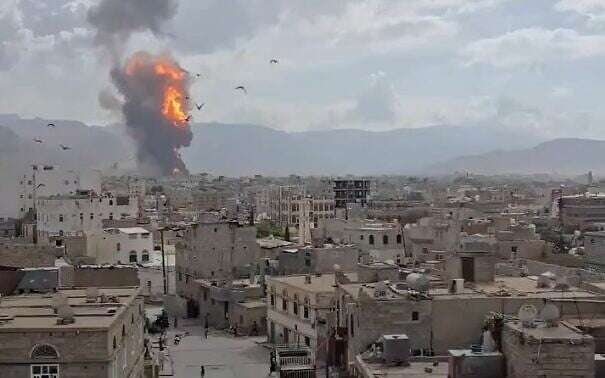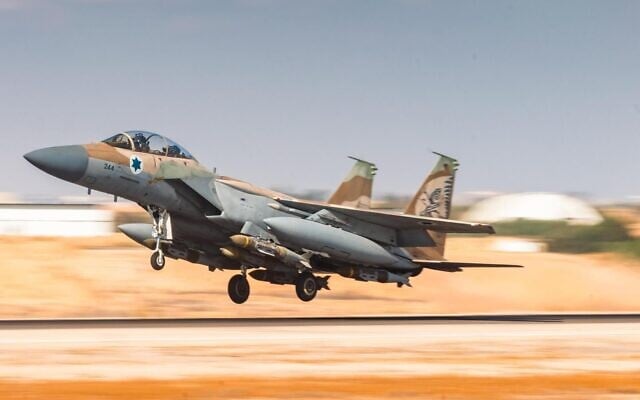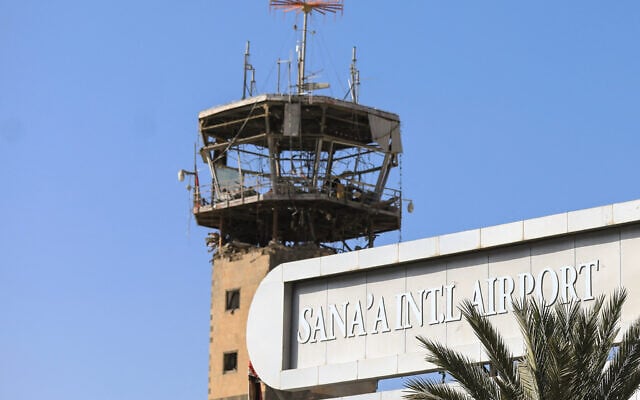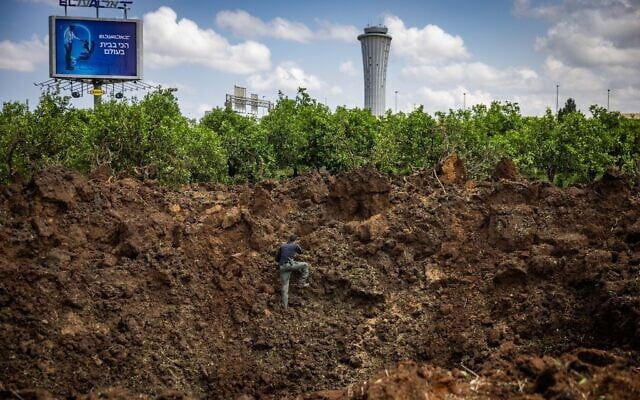



Israeli warplanes carried out a wave of airstrikes in Yemen on Tuesday afternoon, which the military said “completely disabled” Sanaa International Airport in the Houthi-controlled capital and hit other targets.
The strikes, for the second day in a row, came in response to the Iran-backed group’s repeated missile and drone attacks on Israel, including one missile that hit inside the grounds of Ben Gurion Airport on Sunday, the Israel Defense Forces said.
Dozens of Israeli Air Force aircraft were involved in the strikes on Yemen on Tuesday, including fighter jets, refuelers, and spy planes.
Sanaa International Airport, which had been hit once by the IAF before, was “completely disabled” following the strikes that targeted its runways, aircraft, and infrastructure, the military said.
Footage posted online purportedly showed the Israeli strikes. There were no immediate reports of casualties.
The IDF said that the airport was used by the Houthis “for transferring weapons and operatives, and is regularly operated by the Houthi regime for terror purposes.”
An hour before the strike on the airport, the IDF issued an unprecedented “urgent” warning to civilians. In a post to X, the IDF’s Arabic-language spokesman, Col. Avichay Adraee, said, “We call upon you to evacuate the airport area immediately and warn everyone in your vicinity of the need to evacuate this area immediately.”
Additionally, the IDF said it targeted several “central” power stations near Sanaa, which it said were used by the Houthis, along with a cement factory in the city of ‘Amran, north of the capital, which it claimed was used by the group to construct infrastructure and tunnels.
The strike on the concrete factory “constitutes a blow to the regime’s economy and its military buildup,” the army said.
A day earlier, the Israeli jets targeted another concrete factory it said was used by the Houthis, along with infrastructure at the port of Hodeida.
Tuesday’s sortie was the seventh Israeli strike in Yemen since the beginning of the war. The IDF had stopped responding to the Houthis’ missile and drone fire on Israel after the US launched a major aerial campaign against the Iran-backed group in March, but resumed attacks on Monday following the Ben Gurion Airport attack.
Israeli warplanes first hit Sanaa International Airport in December, with the IDF saying at the time that “infrastructure used by the Houthi terror regime for its military activities” was targeted. An employee of the UN Humanitarian Air Service was wounded in that strike, which took place while World Health Organization Director-General Tedros Adhanom Ghebreyesus was in the airport waiting to depart.
Israeli officials have said that all of the IAF’s strikes in Yemen were coordinated with the US, but were not joint operations.
On Sunday, a Houthi missile landed inside the perimeter of Ben Gurion Airport near Tel Aviv for the first time, in a grove of trees alongside an access road close to the airport’s main Terminal 3, several hundred yards from the facility’s control tower.
The missile gouged a wide crater in the ground near an airport parking lot, and injured six people, none of them seriously, prompting most international airlines to suspend flights.
The Houthis said they would “work to impose a comprehensive air blockade on the Israeli enemy by repeatedly targeting airports, most notably… Ben Gurion Airport.”
The Houthis — whose slogan calls for “Death to America, Death to Israel, [and] a Curse on the Jews” — first began attacking Israel and maritime traffic in November 2023, a month after the October 7 Hamas massacre.
The Houthis held their fire when a ceasefire was reached between Israel and Hamas in January 2025. By that point, they had fired over 40 ballistic missiles and dozens of attack drones and cruise missiles at Israel, including one that killed a civilian and wounded several others in Tel Aviv in July, prompting Israel’s first strike in Yemen.
Since March 18, when the IDF resumed its offensive against Hamas in the Gaza Strip, the Houthis have launched some 27 ballistic missiles and several drones at Israel.
The sirens warning of missile attacks have sent hundreds of thousands of Israelis rushing to shelters at all hours of the night and day, causing a number of injuries in the scramble during threats from the incoming missiles and also as a precaution against falling debris from intercepts, which have occasionally caused injuries, death, and damage.



